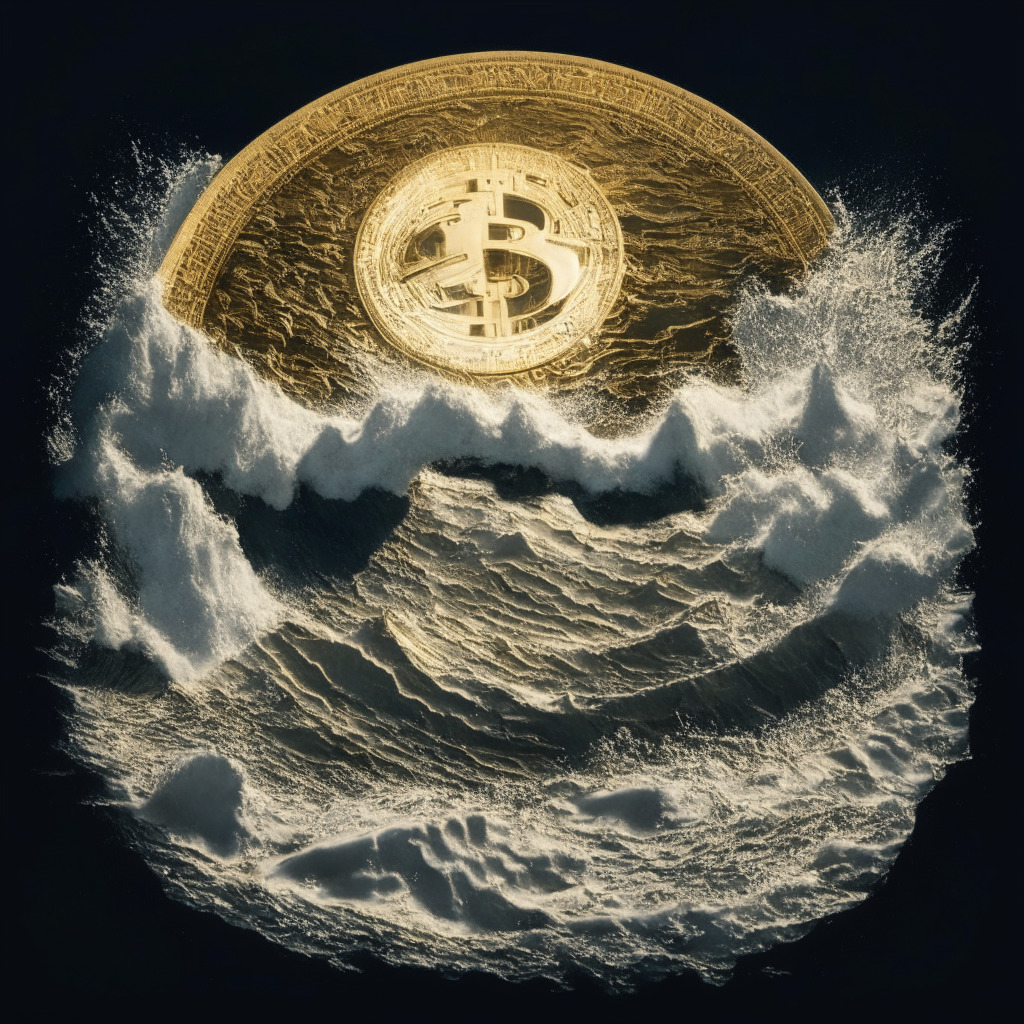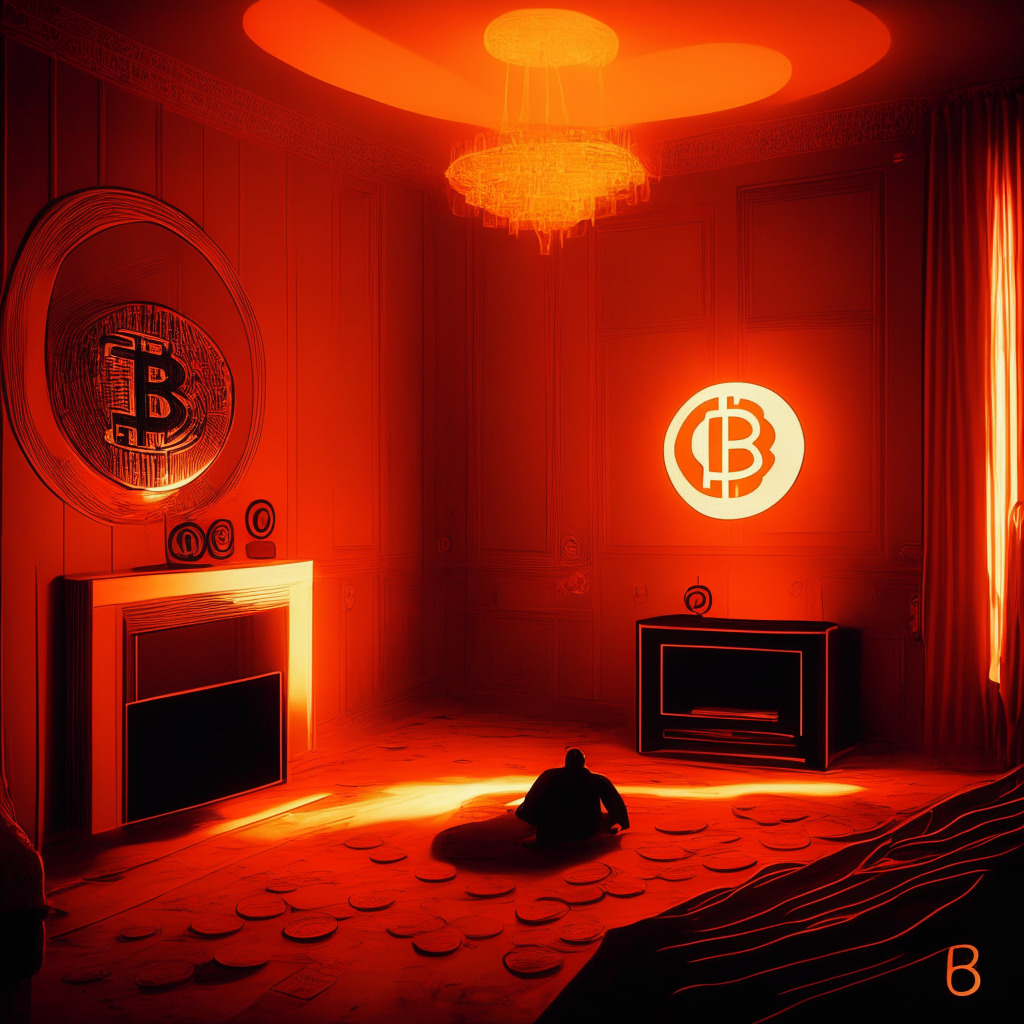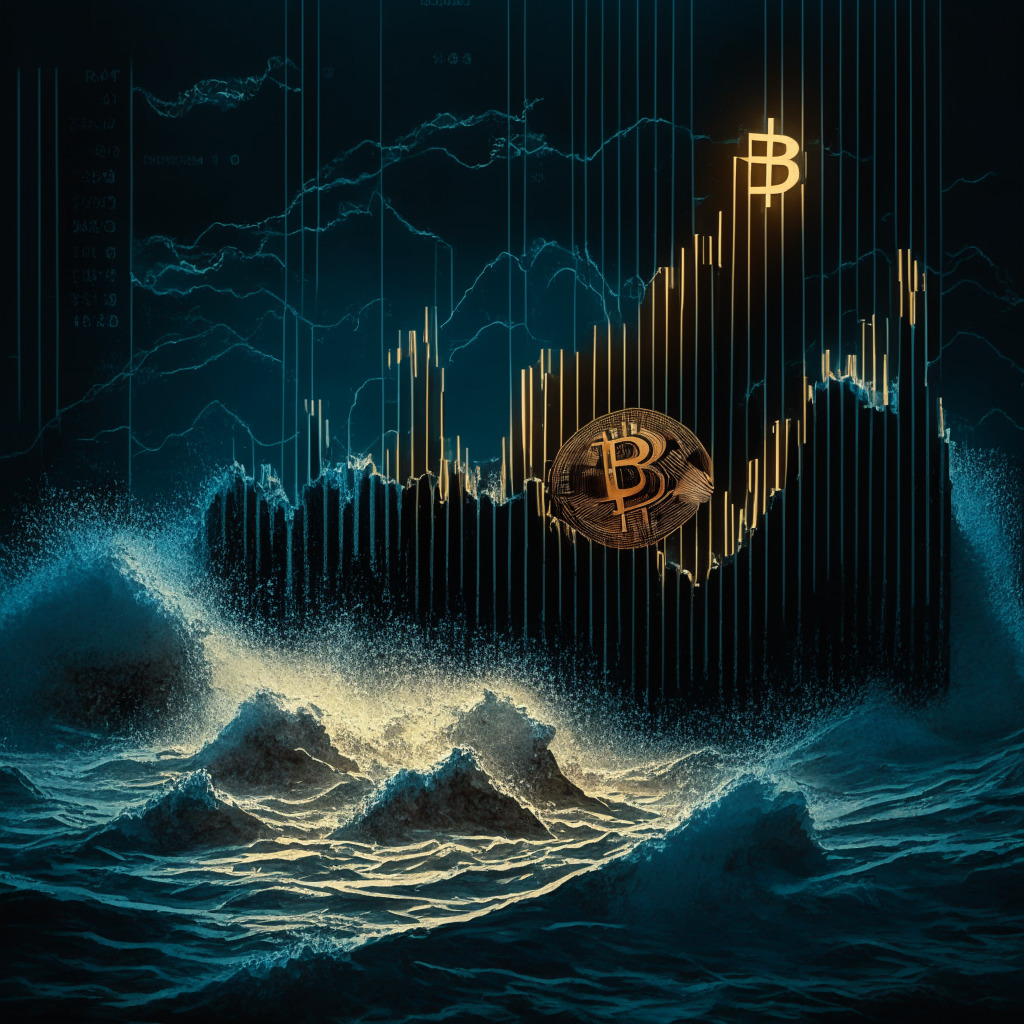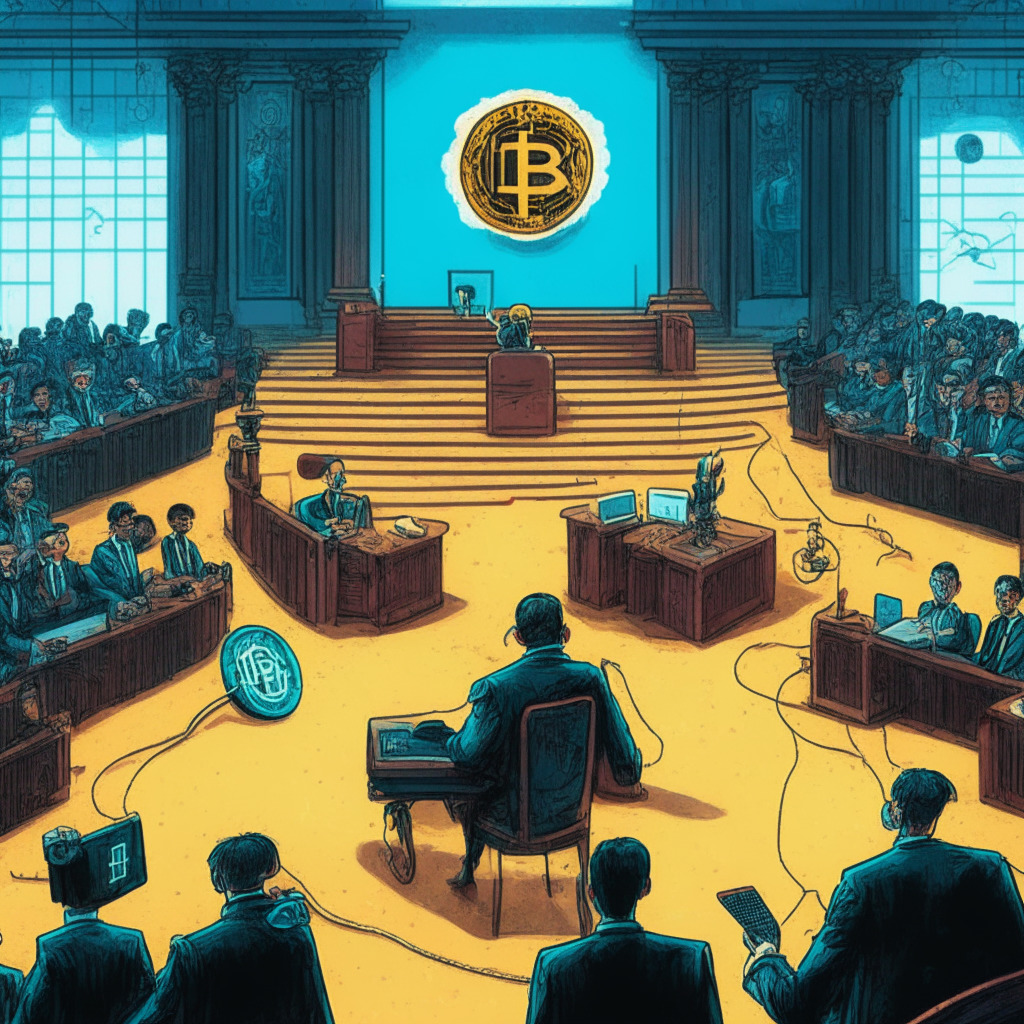Wall Street Memes ($WSM) has become the fourth most traded meme coin globally within a week of its listing on OKX, with nearly $60 million worth of $WSM traded. This new player in the meme coin market has gained popularity due to its connection with Elon Musk and its distinct feature – a staking system for users. While $WSM’s future seems promising, potential risks and challenges specific to meme coins should be considered carefully.
Search Results for: OKX
Heartening Rise of $WSM: Outpacing Iconic Meme Coins & Aspiring to Democratize Finance
Wall Street Meme’s $WSM meme coin is rapidly gaining traction in the crypto landscape, with a 183% price surge giving presale buyers nearly 3x returns. The coin’s high trading volume and a potential October launch of a major product are contributing to growing anticipation in the market.
Climbing the Ranks: The Rise and Uncertainty of Wall Street Memes Cryptocurrency
“Wall Street Memes (WSM), a new cryptocurrency, has seen a 30% valuation increase since its launch and has a promising estimated value of $0.045620 as of September 29. Despite its success, new crypto entrant, Meme Kombat casts uncertainty on WSM’s future, underlining the high-risk nature of crypto investments.”
Pepe Coin’s Resurgence Vs The Rise of TG.Casino: Navigating the Crypto Gaming Space
While Pepe Coin (PEPE) recently saw a 5% rise and a 91% increase in trading volume, its future remains uncertain with potential resistance looming. On the other hand, TG.Casino ($TGC), a budding crypto gaming ecosystem, offers promising growth with robust encryption, a functional token system and swapping capabilities, urging prospective investors to look closely at the disrupting token’s merits.
Dwindling Dominance: Binance Market Share’s Alarming Plunge amidst Regulatory Heat
“Binance, a major player in the crypto space, has seen a notable decline in market share among non-dollar crypto exchanges. Co-founder, Yi He, has urged employees to focus on product conceptualization and improving client experiences, disregarding regulatory pressures and competitors’ expansions.”
Explosive Growth of Wall Street Memes Coin Puts Established Names in the Shade
“Wall Street Memes ($WSM) has surged to the forefront of the meme cryptocurrency world, securing the top spot on exchanges like OKX and Huobi. With an initial value of $0.025, $WSM is now trading at a higher price of $0.040, boasting a market capitalization of $78 million. The Wall Street Memes aim to champion the cause of the average Joe against Wall Street’s might, demonstrating a financial revolution.”
Coinbase’s Unpursued Acquisition of FTX Europe: The Impact on Crypto Derivatives Trading
Coinbase reportedly aimed to acquire bankrupt FTX Europe to expand its overseas derivatives business but ultimately pulled out. The sale of FTX Europe illustrates the high stakes in the crypto sphere, and the growth and risks associated with derivatives trading.
The Impending Exodus: FCA’s New Crypto Rules Stir Unrest Among UK-Based Exchanges
The new Financial Conduct Authority (FCA) rules aiming to make crypto advertising transparent and unbiased, have caused major digital asset exchanges, like Bybit, to contemplate exiting the UK market. The regulations, effective October 8, prohibit certain incentives and bonuses. However, some industrial members see these rules as growth limiting and greatly restrictive.
Navigating Celebrity Endorsements in Cryptocurrency: A Tale of Risk and Opportunity
“Australian F1 star Daniel Ricciardo and Olympic snowboarder Scotty James grappled with doubts when endorsing crypto exchange OKX, especially after the FTX debacle. Despite initial hesitations, they built trust over time through active steps taken by OKX to educate them about cryptocurrency.”
Coinbase CEO Confirms Lightning Network Integration: A Strategic Move to Enhance Transaction Efficiency
Coinbase CEO, Brian Armstrong, recently announced the firm’s plan to bring the Bitcoin Lightning Network into its operations. This second-layer solution improves transaction speeds, enabling competition with more efficient solutions. Coinbase’s move is expected to give them a competitive advantage in the increasing crypto market competition.
Komainu and Hidden Road Partnership: Elevating Trust in Crypto or Fueling Centralization?
“Institutional investors and partnerships may significantly inspire trust in the crypto industry. The recent alliance between Komainu and Hidden Road engages a secure, regulated custody platform, opening the digital asset marketplace to secure transactions and fostering industry growth and longevity.”
U.S. Regulatory Hurdles: Driving Crypto Startups Towards Friendlier Shores?
“Ripple’s CEO, Brad Garlinghouse, argues that the U.S. is the worst country for crypto start-ups due to its hesitance towards digital asset innovation. He highlights the UK, Singapore, UAE, and Switzerland as nations nurturing such innovation. Aggressive lawsuits by SEC and CFTC complicate the implementation of crypto regulations in the U.S., possibly inducing a mass exodus of blockchain startups to friendlier jurisdictions.”
Bitcoin’s Rapid Recovery: Is it a Short Squeeze or a Blip on the Chart?
“Bitcoin’s sudden recovery to approximately $26,000 raises questions about the influence of major exchanges. However, without strong bullish catalysts, this resurgence may face resistance. Fears of an altcoin crash emerge as FTX exchange plans to offload an estimated $3.4 billion in altcoins, hinting at a bearish market for this crypto category.”
Crypto Trading Liquidity: Binance’s Dominance, Market Volatility & the Double-Edged Sword of Centralization
“Liquidity centralization in the cryptocurrency market, controlled by major exchanges including Binance and Coinbase, offers advantages like enhanced trading experiences but also increases the risk of market disruptions. Analysts suggest this intense concentration may return volatility to the crypto market, affecting its predictability.”
Hong Kong’s Digital Yuan Testing Phase II: A Leap to Future or a Threat to Privacy?
“Hong Kong is advancing on the second phase of technical testing for China’s digital yuan, focusing on the digital wallet’s top-up functionality via the Faster Payment System. Concomitantly, the city grapples with challenges balancing financial innovation and consumer protection in the fast-paced digital currency landscape.”
Exploring Tamadoge’s Strategic Token Burn Scheme and its Impact on $TAMA’s Value
Web3 games platform Tamadoge initiates a burn program to enhance the scarcity and value of its $TAMA token, aiming to curb circulating supply. The program employs three methods: Mega Burns, Community Burns, and Platform Revenue Burns, and is accompanied by promotional events. The company also introduced token staking with a pool of two million $TAMA tokens as rewards. They’re also focusing on building brand awareness while retaining their gaming user acquisition strategy.
Crossing Borders: Crypto Regulation Varies from U.S Celebrities to Chinese Property Laws
“Cryptocurrency regulation is emerging as an international focal point, highlighting distinct differences between jurisdictions. While China’s court recognizes crypto as property, South Korea targets North Korean digital assets. Meanwhile, the London Stock Exchange and OKX embark on blockchain ventures, and MoonPay adapts to UK regulations.”
Soccer Legend Ronaldo’s NFT Gameplan Vs The Regulatory Framework of Crypto Markets
“Soccer legend Cristiano Ronaldo, an early adopter of NFTs, recently revealed his future plans for more NFT collections through a lie detector experience. As crypto markets evolve, sports stars like Ronaldo are actively participating, but it’s crucial for individuals and corporations to tread cautiously.”
Chicago Mercantile Exchange’s Growing Influence on Bitcoin Futures: Promising or Overrated?
“Chicago Mercantile Exchange (CME) has played a key role in the Bitcoin futures market, amassing an impressive $5.45 billion open interest by October 2021. However, despite this surge, its pricing dynamics and volumes differ significantly from other crypto exchanges, making its position somewhat skewed when reflecting the overall crypto market. These differences also impact CME’s pricing, hindering its ability to accurately mirror Bitcoin’s price movements on other exchanges.”
Binance Quietly Removes Banco de Venezuela: Blockchain Freedom Versus Economic Sanctions
Cryptocurrency exchange Binance has silently removed Banco de Venezuela from its P2P service list, mirroring U.S Treasury-imposed financial sanctions. The move raises concerns among Venezuelan crypto enthusiasts, notably because the bank plays a crucial role in Venezuela’s digital currency ecosystem. Despite the silent removal, users can reportedly circumnavigate the ban due to the P2P nature of the services.
Binance’s Existential Crisis: Will the Crypto Giant Exit Russia Amidst Growing Legal Woes?
“Binance, the leading crypto exchange, is considering an absolute exit from Russia amid increasing Western sanctions. This comes after allegations of enabling transactions related to sanctioned Russian banks, escalating global legal issues, and potential indictments for possible infringement of anti-money laundering laws.”
Decentralization Versus Sanctioned Russian Banks: The P2P Dilemma in Crypto Exchanges
Crypto exchanges including OKX and Bybit have delisted Russian banks Tinkoff and Sberbank, due to Western sanctions following the Ukraine invasion. Despite this, the decentralized nature of P2P transactions makes complete enforcement challenging. The delistings highlight the growing reliance on cryptocurrencies amid Russia’s economic instability due to these sanctions.
Unravelling the Blockchain Future: Justice, Global Sanctions, Charity Initiatives, Twitter Vulnerability, and Investment Trends
“In the face of persistent complications, the future of blockchain teeters precariously between pathbreaking transformation and a potential bubble. Blockchain’s breathtaking scope and opportunities invariably throw up a set of challenges for us to navigate. Our choices shape the blockchain of tomorrow.”
Removing Sanctioned Russian Banks from Crypto Exchanges: A Double-Edged Sword for Global Compliance
Crypto exchanges OKX and ByBit have excluded sanctioned Russian banks, including Tinkoff Bank and Sberbank, from their payment options. Despite their removal, private transactions through these banks continue. The development highlights the friction between user services and adhering to international financial regulations in the crypto industry.
Pepecoin’s Future Questioned: Insider Trading and Heist Allegations Cause Market Unrest
“The Pepecoin community faces allegations of insider trading and the heist of 16 trillion PEPE tokens. Renowned crypto enthusiast, Jeremy “Pauly” Cahen, has accused insiders of significant internal selling and strategic offloading of tokens. His findings suggest the existence of multiple accounts linked to the Pepecoin team, housing PEPE tokens worth millions. These unsettling revelations have negatively affected Pepecoin’s market performance.”
Funding Success and Regulatory Hurdles: The Rise and Tribulations of Crypto in Dubai
“Dubai-based cryptocurrency exchange BitOasis has garnered substantial investor funding, particularly from Indian digital-asset platform CoinDCX. Despite challenges, it remains a key market player in the Middle East and North African regions, amidst notable growth in the crypto sector. Dubai continues to emerge globally as a leading crypto hub, necessitating increased regulatory oversight.”
Pepe Coin Shock Drop: Market Tumult, Future Prospects & the Rise of Wall Street Memes Coin
Pepe Coin ($PEPE) experienced a 14% plunge due to social media-driven fear. However, with a shift in perspective highlighting the minimal ‘rug’ possibility due to the coin’s distribution, the core fundamentals remain solid, inferring future expansion. A noteworthy alternative is Wall Street Memes’ ($WSM) coin, entering the meme coin market with promising prospects.
Bitget Enhances Security with Revised KYC: What it means for Crypto Trading
“Bitget revised its Know Your Customer (KYC) guidelines in a move to align with international regulatory standards, providing a secure environment for crypto trading. From September 2023, new users will need to complete level 1 KYC verification to avail Bitget’s services, emphasizing its adaptability to evolving regulatory parameters. Existing users have until October 1, 2023, for compliance.”
Sudden Upheaval in Bitcoin Perpetual Futures: Analyzing the Volatility and Risk Factors
Bitcoin’s volatility index, DVOL, recently surged, causing a stir as funding rates for Bitcoin perpetual futures dipped globally. According to Griffin Ardern, a volatility trader, this sudden price dip triggered hedging behaviors, catalyzing a deeper decline. These shifts highlight the complexities and inherent risks in crypto markets and crypto futures trading.
Regulatory Ripples: The SEC’s Case against Ripple and the Future of Stablecoins in Canada
“Judge Torres’s ruling in the ongoing Ripple case might bring regulatory clarity to the crypto community. Meanwhile, Coinbase suspended certain stablecoins in Canada, raising questions on whether this regulatory rigour might affect the growth of blockchain’s future or secure the crypto future.”
Navigating Crypto Seas: Kraken’s Success Amid Canada’s Stringent Regulations
Canada’s strict crypto regulations provide clear direction for crypto businesses, says Mark Greenberg, Kraken Canada MD. Despite complexity and the resistance from major banks, these regulations have contributed to Kraken’s success and longevity in Canada.
Rising Crypto Derivatives Amid Spot Market Decline: An Impending Liquidity Crisis or Institutional Adoption Booster?
“A Q2 2023 report indicates a significant expansion in crypto-derivatives fueled by decreased spot market liquidity and a shift towards using derivative instruments. This is a result of regulatory scrutiny, significant SEC actions, and a complex interplay of market factors. Consequently, the emerging crypto derivatives market holds substantial potential for global institutional adoption, even amid regulatory uncertainty.”






























